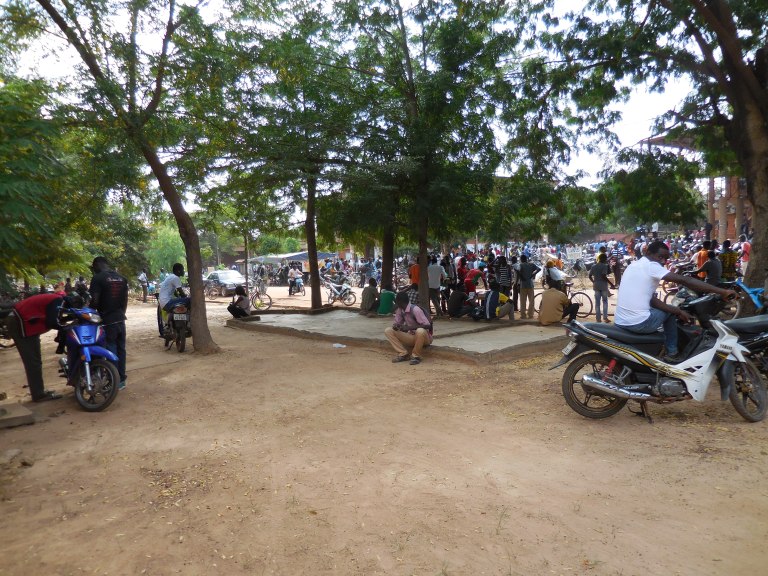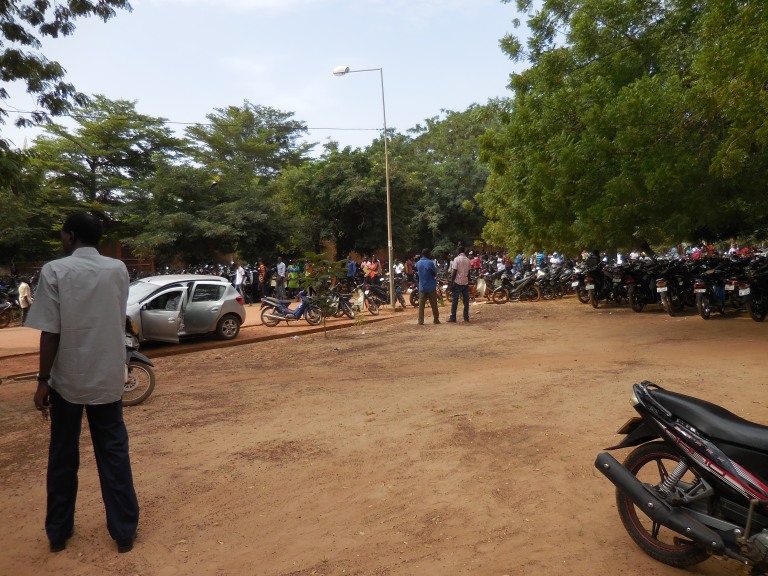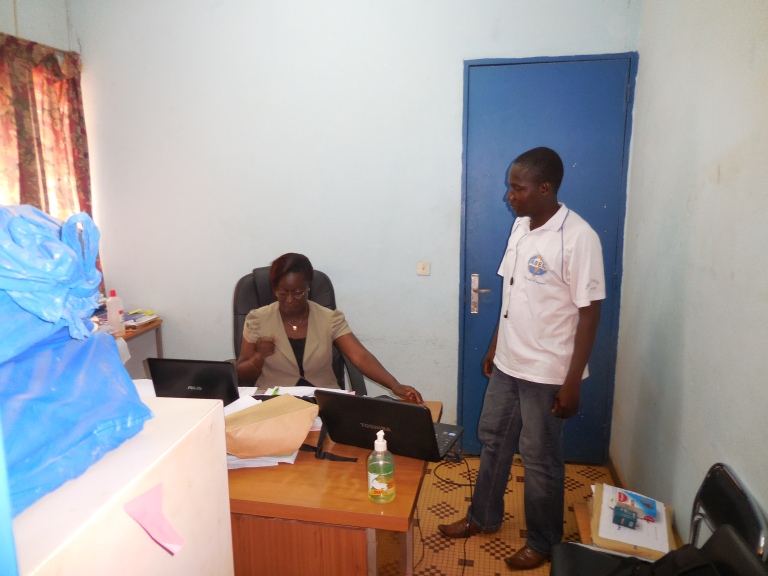This morning bright and early, I got up and called Madame Ilboudo, my boss at the university. She told me to come on down, that she was ready to make my course assignments now. So off I went on my new bike to campus. When I arrived, this was the scene that awaited me
The new first-year students, the people who passed the end-of-secondary-school “bacc” exam, were there to sign in to the university for what they hope will be four years of education followed by a swift transition into the ranks of the salaried petit bourgeoisie. In the classic French system of education, people are peeled off at each step through the process by competitive exams. Some people leave after elementary school, to be sent to training schools for trades. Some people leave after what would be the equivalent of the junior year in high school, to get technical training or do apprenticeships. Some people get to the “terminale” class, a sort of 13th grade, and get to take the baccalaureate exam. Of those, the state sets the bar high enough that only enough potential university students will be allowed to pass to fill the perceived need in four years for university-educated people. Needless to say, the high-stakes exams are very stressful. My neighbor, Mariette’s big sister Fanny, is getting ready to take the junior-year exam that will allow her to finish high school and perhaps go to university. I bought her some books the other day and offered to look over her assignments.
The folks filling the courtyard in front of Mme Ilboudo’s office were the lucky ones, about 6,000 students out of 17,000,000 people in the country who have a chance to go to university each year (there are smaller universities in two other cities in the country, but this is by far the biggest one). Of those, some will fall by the wayside, and perhaps 3,000 or so will graduate, and in principle the public sector plus private business will be able to absorb them in salaried jobs. The principle is violated often enough that there is a large underemployed intelligentsia that has posed political problems in other African countries. The guy who sold me my cell phone SIM card by the side of the road a few weeks ago upon my arrival here claimed (at least) to have a university degree in English. And his English was mighty good. Although he was sitting in front of the Telmob office (the state telephone monopoly’s cell phone department), I don’t think he is a salaried employee. Or else he’d have an office in the air-conditioned interior. His technical skills seemed pretty high, though.
So anyway, in I went to Mme Ilboudo’s office, after locking up the bike outside along with the hundreds of other bikes and motos
Mme Ilboudo is the director of the Department of History and Archaeology. As such, she gets to make all the decisions. She picks classrooms, assigns classes, fights with the administration over the number of benches that are going to be put in classrooms, tries to get an air conditioner fixed in a colleague’s office, and otherwise does a host of things that one would expect a professional administrator to be responsible for. During the morning I sat in her office, I saw her do all these things. Along the way, she advised a couple of graduate students on an issue related to their field work in a village – the village chief was apparently either trying to make some money off them or else he was tired of seeing researchers – counsel a couple of master’s students on their studies – go and get your thesis done, she said – and, in passing, assign me to a class. She did all this in an office about the size of a postage stamp, an office which was, nonetheless, air-conditioned:
I say “a class”, because right now I have one class. However, it is a heck of a class. I will be teaching Intro to US History (les Etats-Unis depuis la fin de XVIIIème Siècle) to somewhere around 1,000 students in an enormous amphitheater. I don’t imagine that I’ll be assigning them term papers. Mme Ilboudo suggested group projects.
After meeting with her, she took me over and introduced me to Professor Maurice Bazemo, the guy who does Atlantic history and the slave trade here. He focuses on the slave trade and pronounced himself very interested in having me help him with the American/Latin American side of the story when he teaches his class next semester. Right now, he is doing pre-colonial African history, and, while I had a field in pre-colonial Africa with Sara Berry at Hopkins 25 years ago, I don’t think I could contribute much to his class. I might go sit in, though, to see how he does it and work on my French.
I am a little concerned about the French part. These people speak really good French. The director of the Human Sciences Department (the Dean, one would say) had very good French from France. My accent is somewhat laughable, though of course since everyone here is unfailingly polite, nobody snickered in my hearing. But I know that this is going to be tough. I think that’s why she only gave me one class the first semester – a normal load is three.
God knows how they manage to grade 3,000 exams. Nobody offered me any grad students.
Oh, and on the way back, I managed to break the seat on the bike. I’ve called Djibi and hopefully we can get a tougher one from the bike guy.



I love this comment–you are re-living those first days as a teacher. All of it is experience (trouble after you’ve had it!!).
LikeLike
Unlike me, you’re not overly self-conscious when you speak French. I’m the type of speaker who has to be grammatically and idiomatically correct before I open my mouth. And then I worry about my pronunciation on top of that. So, I think you’ll do just fine. And beside, I suppose that not all your students speak “comme il faut”.
LikeLike